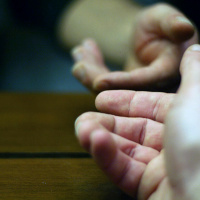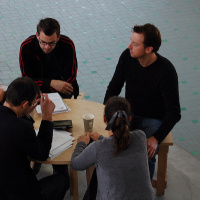Informações:
Sinopsis
Australia Plus Learn English is a free service for anyone learning English and is produced by the ABC, Australia's national public broadcaster.
Episodios
-
Keeping A Conversation Going
24/03/2016 Duración: 01minKeeping a conversation going To keep a conversation going it is important to show you are listening and want the conversation to continue. Here are some things you can say to keep a conversation going: ‘Really’ A: I went to the beach yesterday. B: Really? A: Yes, we drove there in the morning and had a lovely day. ‘I see’ A:I usually walk along the path by the river. B: I see. A: It’s lovely there in the morning. ‘That’s interesting’ A: My son is a great swimmer, he would swim all day if I let him. B: That’s interesting. A: Yes, he’s going to start competing for his school. You could ask a short question to keep the conversation going: A: I’m really looking forward to the party on Saturday. B: Are you? A: Yes, I think everyone will be there. We can also repeat part of what the other person has said to link to a follow up response. B: I live in Paddington. A: Paddington, that’s very close to the city isn’t it? Flickr CC: Kevin Dooley
-
Past Continuous
24/03/2016 Duración: 58sPast continuous You use the past continuous tense to talk about something that occurred in the past. Past continuous tense is used when the action you’re talking about started before the moment you’re describing, but had not finished. For example, in past tense, you might say: ‘I watched a film on TV yesterday. The film started at 7pm and finished at 9pm.’ When we use the past continuous we say: ‘At 8pm yesterday I was watching TV.’ The past continuous can be used to say that something happened in the middle of something else. For example, in past tense, you might say: ‘I cooked dinner yesterday. My sister called me.’ When we use the past continuous we say: ‘I was cooking dinner when my sister called.’ Flickr CC: Dwight Sipler
-
Asking For Advice
24/03/2016 Duración: 54sAsking for advice. There are many ways to ask for advice, here are some of the more common ones: What do you think I should do about _____? ‘What do you think I should do about the broken window?’ What should I do about _____? ‘What should I do about John? He never does his homework.’ What would you do about____? ‘What would you do about finding a new job? I don’t know where to start. What do you think I should do? ‘I can’t decide which car to buy. What do you think I should do?’ What do you think I should do about_______? ‘What do you think I should do about a new hair style?’ Can you give me some advice about_______? ‘Can you give me some advice about how to apply for a new course?’ Flickr CC: Rita M.
-
Concern And Sympathy
24/03/2016 Duración: 54sConcern and Sympathy There are many ways we can express concern and sympathy. We could say: ‘That’s terrible.’ I had a car accident on the weekend. That’s terrible, are you OK? ‘I am sorry to hear that.’ I can’t come to the party on Saturday night. I’m sorry to hear that. ‘I know how you feel.’ I’m so upset this morning. I lost my wallet on the way to work. I know how you feel, that happened to me a few years ago. ‘I hope you feel better soon.’ I’m going to leave early. I’ve got a bad headache. I hope you feel better soon.
-
Debate And Discussion
24/03/2016 Duración: 01minDebate and discussion A discussion is a detailed conversation. ‘We had a long discussion about which school I should go to next year.’ ‘The discussion was very helpful. I think I’m ready to make a decision.’ A ‘debate’ is a discussion in which people argue or consider opposing points. ‘We debated whether to have pizza or sushi for dinner.’ ‘The meeting went on for hours as we debated the benefits of both sides.’ The word ‘debate’ can also describe a formal speaking contest in which two teams argue a given question. Formal ‘debates’ are most likely to take place at school or university. ‘Our team won the debating contest.’ Debates also take place in politics. ‘Parliament sat late into the night as members debated the bill.’ Flickr CC: Simon Blackley
-
Similar sounds
23/03/2016 Duración: 01minEnglish has a large number of similar sounds with only very small minor variations. Today, we are going to practise two similar vowel sounds; /e/ and /eɪ/; wet /e/ wait /eɪ/ test /e/ taste /eɪ/ Listen to the following words and put them into the correct columns. I will say each word two times: /e/ /eɪ/ waited ✓ wreck rake saint sent hail hell shed shade bend vetted Come back tomorrow and check your answers. Flickr CC: Jeff Golden
-
Certainty and Uncertainty
23/03/2016 Duración: 58sCertainty and uncertainty ‘Certainty’ is the firm belief that something is true. ‘Do you think it will rain today?’ ‘I am certain it is going to rain.’ You can express certainty by saying: ‘I am confident it will rain.’ ‘I am positive it will rain.’ ‘I am sure it will rain.’ ‘It will definitely rain today.’ Uncertainty is the state of being unsure. You don’t know if something is true, or you haven’t decided. ‘Do you plan to go to university when you finish school?’ ‘I’m still uncertain about that.’ You can express uncertainty by saying: ‘I am not sure.’ ‘I may go.’ ‘I haven’t made up my mind.’ ‘I might go.’ ‘I haven’t decided yet.’ Flickr CC: Viewminder
-
Pronunciation of 'ed' sounds
23/03/2016 Duración: 01minEd Regular verbs in the simple past end in ‘ed’. There are three ways that we can pronounce a word that ends in ‘ed’ Can you hear the difference? Called Asked Acted In ‘called’ you can hear a /d/ sound. Listen for the /d/ sound in these words: Played Cared Cried In ‘asked’ you can hear a /t/ sound. Listen for the /t/ sound in these words: Missed Placed Shipped And in ‘acted’ you can hear a /id/ sound. Listen for the /id/ sound in these words: Crowded Ended Floated Flickr CC: Melvin Gaal
-
Complimenting food
23/03/2016 Duración: 53sComplimenting food There are a number of ways that we can compliment food, or the person that prepared the food. Here are some of the most common phrases and expressions that we can use. When you have just been given a plate of pasta: This lasagna is delicious. You have just tasted some soup: I have never tasted a soup like this before. You have just eaten a tasty salad: This is the most delicious salad in the world. You have just had some apple pie: This is the best pie that I have ever had! The meal has just finished: You are a fantastic cook. Can you think of any other ways to compliment food, or the chef? Flickr CC: Jeff Golden






















